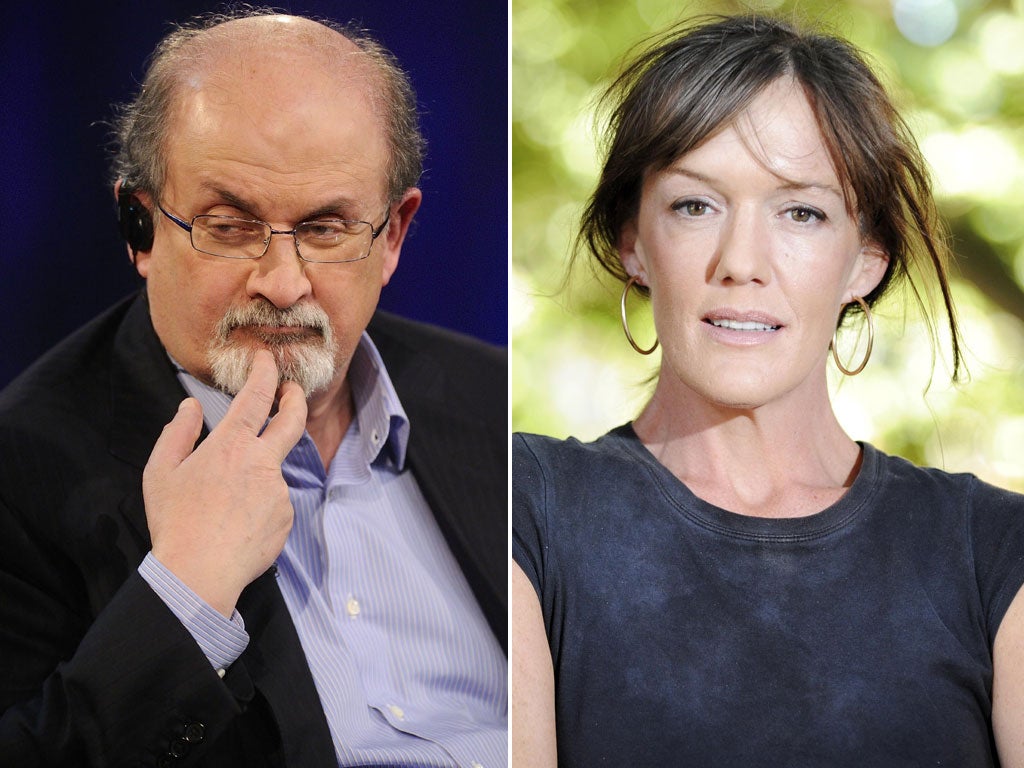Will Salman Rushdie greet this stinging review with 'lordly nonchalance'?
Author-critic Zoe Heller's excoriating verdict on the literary titan's book expected to start a fight

Your support helps us to tell the story
From reproductive rights to climate change to Big Tech, The Independent is on the ground when the story is developing. Whether it's investigating the financials of Elon Musk's pro-Trump PAC or producing our latest documentary, 'The A Word', which shines a light on the American women fighting for reproductive rights, we know how important it is to parse out the facts from the messaging.
At such a critical moment in US history, we need reporters on the ground. Your donation allows us to keep sending journalists to speak to both sides of the story.
The Independent is trusted by Americans across the entire political spectrum. And unlike many other quality news outlets, we choose not to lock Americans out of our reporting and analysis with paywalls. We believe quality journalism should be available to everyone, paid for by those who can afford it.
Your support makes all the difference.He has survived a fatwa and is an undisputed titan of modern literature.
But Sir Salman Rushdie appears to have made a new foe in the shape of fellow British writer Zoe Heller – whose scathing review of his memoirs has been described as the most devastating hatchet job of 2012.
Heller's piece, published in The New York Review of Books, condemned the "shuddering hauteur" of Rushdie's efforts, adding that "an unembarrassed sense of what he is owed as an embattled, literary immortal-in-waiting pervades his book".
Joseph Anton: A Memoir is an autobiography depicting Rushdie's struggle in the aftermath of The Satanic Verses, which forced him into hiding for nearly a decade. The work attempts to shed light on the experience and bury the ghosts of the past.
But it found little favour with Heller who, like Rushdie, left Britain for New York nearly a decade ago. In a stinging 2,600-word essay, she wrote: "One would hope that when recollecting his emotions in freedom and safety, he might bring some ironic detachment to bear on his own bombast. Hindsight, alas, has had no sobering effect on Rushdie's magisterial amour propre."
Born in north London, Heller started her career at The Independent on Sunday, later moving to New York. Her second novel, Notes on a Scandal, was nominated for the 2003 Booker Prize and made into a film starring Judi Dench and Bill Nighy. Some of her sharpest criticism is saved for Rushdie's assessment of his marriages, which she deems "egregiously uncharitable". "Rushdie has a habit of excusing his own fairly frequent infidelities and betrayals with reference to the imperative nature of his own desires," she wrote.
Joseph Anton is the pseudonym Rushdie chose while in hiding, borrowing the names from his fellow authors Joseph Conrad and Anton Chekhov. But it is another point of contention for Heller, who describes herself as "struck by the lordly nonchalance with which Rushdie places himself alongside Lawrence, Joyce, and Nabokov in the ranks of literary merit".
Describing the book as written in a "de Gaulle-like third person" she adds: "Throughout this memoir Rushdie claims kinship with any number of great literary men – men who, like him, suffered for their genius, but whose fame was destined to outlast that of their oppressors."
But her greatest criticism is saved for the last lines: "Some readers may find, by the end of Joseph Anton, that the world feels rather smaller and grimmer than before. But they should not be unduly alarmed. The world is as large and as wide as it ever was; it's just Rushdie who got small."
Rushdie did not offer a response when The Independent contacted him on Saturday. But he is unlikely to be silenced for long. His spat with fellow British author John Le Carré in 1997 led to a lengthy exchange of letters and a final assessment in which Rushdie branded the spy novelist "an illiterate, pompous ass".
Meanwhile, America's patience with British authors seems to be wearing thin. The New York Times recently criticised Rushdie's "relentless public presence" which it said "occurs precisely at a moment when many of New York's most successful writers appear to lead lives of domestic tranquillity in Brooklyn".
The gossip website Gawker yesterday acclaimed Heller's review as the best hatchet job of the year, with writer Mallory Ortberg adding: "It is exciting to watch important British people insult each other. They are, generally speaking, much better at it than Americans, partly because reading is a blood sport there, but also because they've had centuries of practice."
Rushdie can nevertheless find some consolation from Heller. In a piece last year for aspiring writers, she wrote: "Having your work occasionally rejected – or poorly reviewed – is not a bad thing for a writer. Naturally, it's horrid at the time, but it does toughen you up. It also forces you to decide whether you're in the game for the long haul or not."
War of words: Literary spats
VS Naipaul and Paul Theroux
Naipaul sold a signed copy of a book given to him by Theroux for $1,500. Theroux branded Naipaul a racist, egoist and mercenary. They finally buried the hatchet in 2011.
Gabriel Garcia Marquez and Mario Vargas Llosa
When Peruvian Vargas Llosa punched the Colombian Marquez in 1976 – allegedly over a woman – it sparked a simmering feud with the pair not speaking for 30 years.
Leo Tolstoy and Ivan Turgenev
Tolstoy described Turgenev as "a bore", and their animosity heated up to the point that Tolstoy challenged his elder to a duel. Turgenev later made a deathbed plea for him to return to writing.
Join our commenting forum
Join thought-provoking conversations, follow other Independent readers and see their replies
Comments